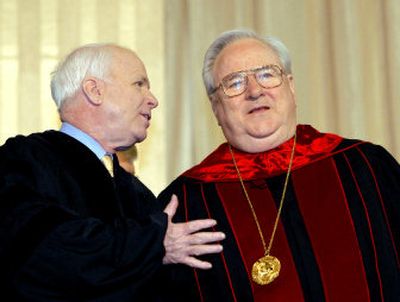McCain embraces Falwell, along with Christian right

LYNCHBURG, Va. – Looking to shore up support from voters he needs to win the 2008 Republican presidential nomination, Sen. John McCain on Saturday embraced the Rev. Jerry Falwell and reached out to his conservative Christian followers during a commencement address at Falwell’s Liberty University.
“We are not enemies,” McCain said, a comment remarkable because McCain had once called Falwell evil.
A smiling Falwell twice called McCain a “great American” and gave him an honorary degree for his “commitment to conservative ideals.”
The rapprochement between two men may help McCain gain political entree to religious voters who play an outsized role in Republican presidential primaries, particularly in the South.
McCain has long been suspect to many Christian conservatives, despite what Falwell said in an interview was their agreement on such key issues as opposing abortion and gay marriage. One reason is McCain’s push for campaign regulations that many conservative groups say curbs their right to influence elections.
The 2,450 graduates and about 6,000 guests interrupted McCain three times with applause – all when he was urging U.S. intervention in the Sudan and elsewhere to end tyranny – and gave him a standing ovation when he finished his 24-minute speech.
During the commencement ceremony, neither man directly addressed their feud in 2000, when McCain angrily blamed Falwell and another Christian conservative, the Rev. Pat Robertson, for smearing him in the South Carolina primary. McCain’s loss to George W. Bush there effectively ended his campaign. The two men made up during a private meeting late last year after Falwell approached McCain.
Rather, McCain used his commencement speech to talk broadly about the need for civility in politics in what appeared to be a reference to his own often contentious relationships with members of his party.
“Let’s not be too dismayed with the tenor and passion of our arguments even when they wound us. We have fought among ourselves before in our history, over big things and small, with worse vitriol and bitterness than we experience today,” he said.
“We are not enemies. We are compatriots defending ourselves from a real enemy. We have nothing to fear from each other. We are arguing over the means to better secure our freedom, promote the general welfare and defend our ideals. It should remain an argument among friends.”
He conceded that he has given in to anger himself. “I regret it very much,” he said.
On the genocide in the Sudan – a pressing issue among many religious conservatives – McCain said the United States hadn’t heeded the lesson of ignoring genocide in Rwanda in the mid 1990s.
“If the United States and the West can be criticized for our role in this catastrophe, it’s because we have waited too long to intervene to protect the multitudes who are suffering, dying because of it,” he said.
“Now, belatedly, we have recovered our moral sense of duty and we are prepared, I hope, to put an end to this genocide.”